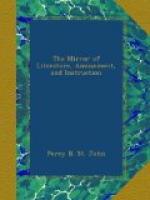no other English book had ever come—on
the very verge of civilization, on the borders of
Turkey—this is indeed a wide reign and a
proud distinction; but prouder still to be not only
read, but to have subjugated, as it were, and moulded
the literary tastes of the civilized world. Voltaire
is the writer who, in his lifetime, has approached
nearest to this extent of popularity. Sovereigns
courted and corresponded with him; his own countrymen
were enthusiastic in his praise; and so general was
a knowledge of the French language, that a large majority
of the well-educated throughout Europe, were familiar
with his writings. But much of this popularity
was the popularity of partisanship. He served
a cause, and for such service, and not alone as the
meed of genius, were honours lavished upon him.
The people of France, by whom he was almost deified
in his latter years, regarded him less as the literary
marvel of their land, than as the man once persecuted
by despotism, and the ablest assailant of those institutions
which they were endeavouring to undermine. But
Voltaire, with all his popularity, has left impressed
on literature scarcely any distinguishable traces
of his power. He exhibited no marked originality
of style—he founded no school—and
as for his imitators, where are they? To justify
the admiration he excited, one must consider not merely
how well, but how much and how variously he has written.
With the exception of Voltaire, and perhaps of Lord
Byron, there is scarcely a writer whose popularity,
while he lived, passed beyond the precincts of his
own country. This, until latterly, was scarcely
possible. Till near the middle of the eighteenth
century, what had been long called the “Republic
of Letters” existed only in name. It is
not truly applicable but to the present period, when
the transmission of knowledge is rapid and easy, and
no work of unquestionable genius can excite much interest
in any country, without the vibration being quickly
felt to the uttermost limits of the civilized world.
How little this was previously the case is evident
from the fact, that numerous and important as were
the political relations of England with the continent,
and successfully as we had attended to the cultivation
of letters, yet it is scarcely more than a hundred
years since we were first known on the continent to
have what might deserve to be called “a Literature.”
Shakspeare, Dryden, and Pope, successively enjoyed
in their own country the highest popularity as writers.
Of these, it may reasonably be doubted whether the
name of the first had been ever heard out of it.
We can find no evidence which shows that the second
had a wider fame. Pope was indeed better known;
for literature had been made conspicuous through honours
paid to it by the statesmen of Queen Anne; and Pope
was the friend of a peer politically eminent, and
was thought, in conjunction with him, to have written
a poem, of which, if the poetry was disregarded, the
opinions were not unacceptable to the “philosophers”
of the continent.




